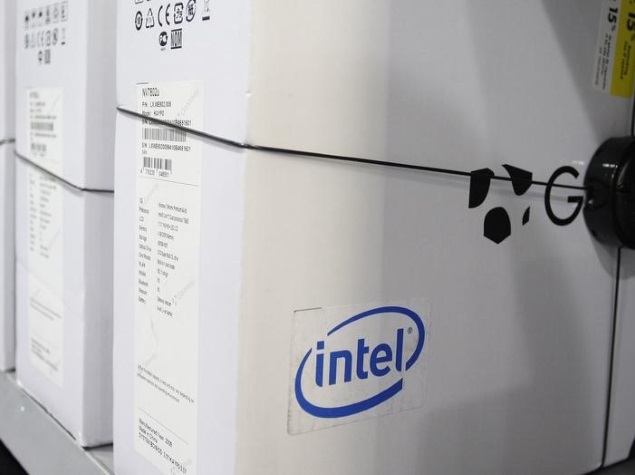- Home
- Laptops
- Laptops News
- Intel's Purchase of Altera Defends Its Data Centre Dominance
Intel's Purchase of Altera Defends Its Data Centre Dominance

Intel's biggest acquisition ever will let the Santa Clara, California company offer twice the computing power when its Xeon processors used in servers are combined with Altera's programmable chips.
With a stagnant PC industry and little progress in smartphones, selling high-end server chips is an increasingly important source of profits.
"This whole deal is defensive for the data centre," said Bernstein analyst Stacy Rasgon, who saw it as an admission by Intel that it was getting harder to drive performance gains.
He questioned Intel's projections for the programmable chip market, which is built on data centre use and growing adoption of Intel chips in everyday objects connected to the Internet. "I think their growth goals are ludicrous," he said. "They think it's going to grow 7 percent a year, but Altera shrunk 2 percent a year in the last three years."
Still, big data companies such as Google, Facebook and Microsoft are all tweaking their servers to get their data centres to run faster and more efficiently. Microsoft has tried using programmable chips combined with Intel's Xeon processors.
Altera's chips, called field-programmable gate arrays (FPGA), can be configured as needed to make servers faster at handling proprietary tasks, like providing web-search results or updating social networks.
"You can put your software down into the silicon," Intel chief executive Brian Krzanich told CNBC in an interview.
Intel, which analysts estimate has more than 90 percent of the data centre market, already has an agreement to use Altera chips. Its move comes as companies such as Qualcomm Inc, using ARM Holdings -designed chips and the soon-to-be merged Avago Technologies and Broadcom Corp, also target the data centre market.
By buying Altera, Intel avoids the risk of being dropped as the smaller company's manufacturing partner, which had been the subject of some speculation, said Gartner analyst Mark Hung.
The purchase means Intel is hedging against the likelihood that the rise of FPGA chips will reduce the need for central processing unit (CPU) chips running servers, where Intel currently dominates.
"This way Intel will profit if customers use FPGAs instead of CPUs," said FBR Capital markets analyst Christopher Rolland. "Intel will be the only company that will be able to combine x86 server CPUs with FPGAs onto a single die. This could eventually be a $1 billion market, with the lion's share going to Intel."
© Thomson Reuters 2015
For the latest tech news and reviews, follow Gadgets 360 on X, Facebook, WhatsApp, Threads and Google News. For the latest videos on gadgets and tech, subscribe to our YouTube channel. If you want to know everything about top influencers, follow our in-house Who'sThat360 on Instagram and YouTube.
Related Stories
- Galaxy S24 Series
- MWC 2024
- Apple Vision Pro
- Oneplus 12
- iPhone 14
- Apple iPhone 15
- OnePlus Nord CE 3 Lite 5G
- iPhone 13
- Xiaomi 14 Pro
- Oppo Find N3
- Tecno Spark Go (2023)
- Realme V30
- Best Phones Under 25000
- Samsung Galaxy S24 Series
- Cryptocurrency
- iQoo 12
- Samsung Galaxy S24 Ultra
- Giottus
- Samsung Galaxy Z Flip 5
- Apple 'Scary Fast'
- Housefull 5
- GoPro Hero 12 Black Review
- Invincible Season 2
- JioGlass
- HD Ready TV
- Laptop Under 50000
- Smartwatch Under 10000
- Latest Mobile Phones
- Compare Phones
- Samsung Galaxy C55
- Blackview Hero 10
- Oppo K12
- Vivo Y200i
- Huawei Pura 70 Pro
- Huawei Pura 70
- Vivo V30e
- Itel Super Guru 4G
- Lenovo IdeaPad Pro 5i
- Asus ZenBook Duo 2024 (UX8406)
- Realme Pad 2 Wi-Fi
- Redmi Pad Pro
- boAt Storm Call 3
- Lava ProWatch Zn
- Samsung Samsung Neo QLED 8K Smart TV QN800D
- Samsung Neo QLED 4K Smart TV (QN90D)
- Sony PlayStation 5 Slim Digital Edition
- Sony PlayStation 5 Slim
- Voltas 1.5 Ton 3 Star Split AC (183 Vectra Elegant 4503545)
- Hitachi 1.5 Ton 5 Star Inverter Split AC (RAS.G518PCBISF)

















